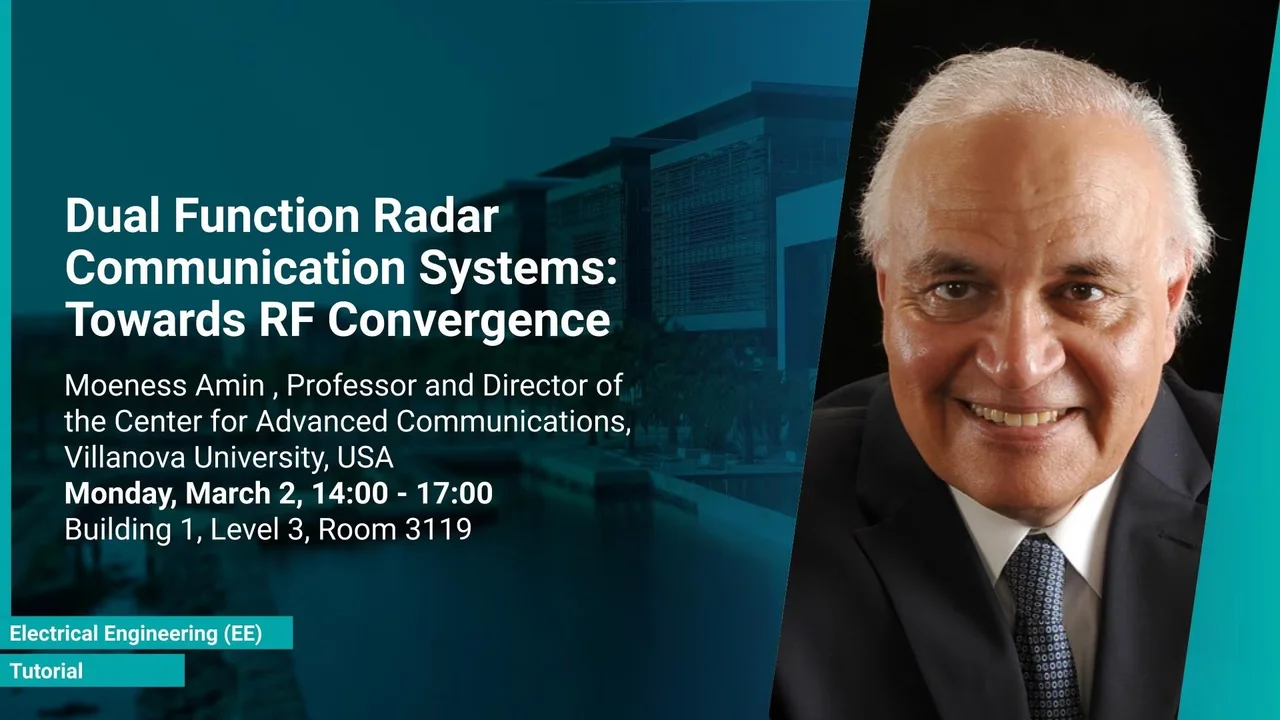
Dual Function Radar Communication Systems: Towards RF Convergence
- Moeness Amin , Professor and Director of the Center for Advanced Communications, Villanova University, USA
B1 L3 R3119
This tutorial establishes and promotes the area of dual system functionality, allowing the radar to house voice and data transmission, leading to technological advances in radar and communications systems. The tutorial develops novel signaling schemes for embedding information into the radar pulsed emissions which, in most cases, is blind to the primary radar operation and radar ambiguity function. It considers different antenna configurations, including multiple-input multiple-output (MIMO) radars and shows how to achieve high data rate communications by combining amplitude-shift keying, phase-shift keying, and code shift keying modulations with waveform-diversity and spatial degrees of freedom.
Overview
Abstract
There is a growing need for bold and new concepts with the potential to contribute towards significant improvements in the efficiency of radio spectrum utilization and protection from interfering services. One of the most pressing problems in the area of spectral congestion and dynamic frequency allocations is to provide uncontested shared bandwidth between radar and communications. This has recently spurred extensive efforts towards devising solutions for simultaneous operations of radar target illuminations and wireless services sharing the same frequency bandwidth. Unlike the general approach of coexistence, which predicates on cognitive radio and cognitive radar for spectrum sensing and utilization, recent research is moving to enable the embedding of communication signals into radar waveforms. In so doing, the communication systems capitalize on the resources of existing radar infrastructure, including high power, large bandwidth, and high-quality hardware. This tutorial establishes and promotes the area of dual system functionality, allowing the radar to house voice and data transmission, leading to technological advances in radar and communications systems. The tutorial develops novel signaling schemes for embedding information into the radar pulsed emissions which, in most cases, is blind to the primary radar operation and radar ambiguity function. It considers different antenna configurations, including multiple-input multiple-output (MIMO) radars and shows how to achieve high data rate communications by combining amplitude-shift keying, phase-shift keying, and code shift keying modulations with waveform-diversity and spatial degrees of freedom.
Brief Biography
Moeness Amin received a B.Sc. degree from the Faculty of Engineering, Cairo University in 1976, MSc from King Fahd University of Petroleum and Minerals in 1980, and a Ph.D. degree from the University of Colorado, Boulder, in 1984, all degrees are in electrical engineering. Since 1985, he has been with the Faculty of the Department of Electrical and Computer Engineering, Villanova University, Villanova, PA, USA, where he became the Director of the Center for Advanced Communications, College of Engineering, in 2002. Dr. Amin is a Fellow of the Institute of Electrical and Electronics Engineers (IEEE); Fellow of the International Society of Optical Engineering (SPIE); Fellow of the Institute of Engineering and Technology (IET); and a Fellow of the European Association for Signal Processing (EURASIP). He is the Recipient of the 2017 Fulbright Distinguished Chair in Advanced Science and Technology; Recipient of the 2016 Alexander von Humboldt Research Award; Recipient of the 2016 IET Achievement Medal; Recipient of the 2014 IEEE Signal Processing Society Technical Achievement Award; Recipient of the 2009 Technical Achievement Award from the European Association for Signal Processing; and the Recipient of the 2015 IEEE Aerospace and Electronic Systems Society Warren D White Award for Excellence in Radar Engineering. He is the recipient of the IEEE Third Millennium Medal. Dr. Amin has over 800 journal and conference publications in signal processing theory and applications, covering the areas of Wireless Communications, Radar, Sonar, Satellite Navigations, Ultrasound, Healthcare, and RFID. He is the Editor of three books titled, Through the Wall Radar Imaging, Compressive Sensing for Urban Radar, Radar for Indoor Monitoring, published by CRC Press in 2011, 2014, and 2017, respectively.